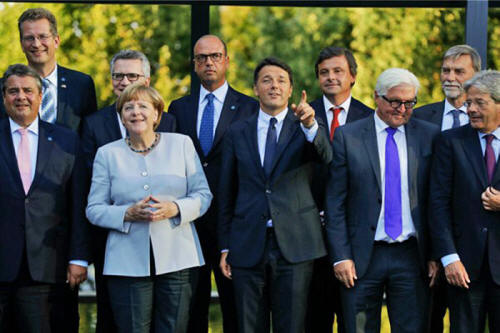|
from WPR Website
flanked by German Chancellor Angela Merkel after a bilateral meeting, Maranello, Italy Aug. 31, 2016
(AP photo by Luca
Bruno).
On paper, it is a referendum on amending
the constitution. But there is far more than that at stake, for
Italy and the European Union.
The Senate would be transformed into a "Senate of Regions" with 100 senators - mainly regional councilors and mayors - while large amounts of power would be taken away from Italy's regions and centralized in Rome.
Renzi has promoted the reforms as a way to simplify and improve Italy's governance, eliminating a major source of political gridlock.
If given the green light, it would mark a significant breakthrough for a country that has endured two decades of sclerotic politics and has had 63 governments since the end of the Italian monarchy in 1946.
But it is increasingly far from certain that the referendum, which Renzi has staked his premiership on, will pass. Not long ago, victory seemed assured. But a growing number of opinion polls now put the "no" camp steadily ahead.
How did this happen?
Today, though, his future looks much less bright, as the past two years haven't gone as he hoped.
Renzi's government has failed to boost Italy's chronically faltering growth, while reforms to key areas such as the labor market, education and the state bureaucracy have yielded limited results.
In addition, the country's looming banking crisis, which raised the threat of a major bank failure all summer, isn't over yet; the unemployment rate is still high; and Renzi's once sky-high popularity is dropping.
When the former mayor of Florence sees
what happened to former British Prime Minister David Cameron
and his own ill-fated referendum on leaving the EU, he must
be worried.
But much like
Brexit, the referendum increasingly
resembles a national election in large part because Renzi said he
would step down if it fails.
For disgruntled Italians,the referendum is turning into a wayto air their general discontentwith Renzi's left-right coalition.
Although he recently tried to dial that down, by promising to resign, Renzi has made this a referendum on himself rather than on the merits of the reforms.
In a politically divided country, where social unrest is flaring, the vote has become an opportunity for opposition parties to gain momentum as alternatives to the establishment.
Meanwhile, for disgruntled Italians, the referendum is turning into a way to air their general discontent with Renzi's left-right coalition and its failure to deliver on its governing pledges.
Besides uniting all the opposition
against him, Renzi's tactical error also falls within a broader
trend across Europe of burgeoning distrust toward European Union
policies, in which critics typecast EU advocates as
enemies to defeat at all costs.
But critics and opposition parties keep saying the amendments are badly written and will make the government too powerful.
In April, a group of legal scholars even cautioned about a potential authoritarian drift. They argued that the reforms, paired with a recently approved electoral law, would give the next prime minister too much power, since the head of government would have five years in office with a guaranteed parliamentary majority, free of even the threat of a rebellion in his own ranks.
The fact that Renzi has a reputation for running government as a one-man show doesn't help him at all.
If the referendum passes, he will have survived a close call, ultimately vindicated by the vote.
If Renzi loses his gamble, the reality of Italian politics is that, not unlike Donald Trump's surprise U.S. presidential election victory this week, no one is quite sure what would happen next.
But there could be vast
consequences for Italy and the rest of Europe.
Although they both declared their support for the "no" camp, Monti and Berlusconi are reluctant to hurt Renzi ahead of the referendum since they fear that a government run by the Five Star Movement could permanently oust them from Italy's political life.
A "no" vote could also give more
power to Euroskeptic parties and potentially disrupt Italy's EU
membership...
But he could be left so weakened
that his government would likely be incapable of governing
effectively, let alone delivering reforms.
Italy's inability to bring down its public debt, which is the highest in the Eurozone after Greece, still provokes concern. Investors are afraid an early departure by Renzi could plunge the country back into political disarray and spark a wider economic crisis across the EU, since Italy is one of the union's weakest links.
Despite Renzi's applauded reform of employment laws, economic growth continues to be sluggish, and the number of jobs added by employers was down by a third in the first seven months of 2016.
But investors' biggest concern remains the Five Star Movement, particularly whether Italy's biggest opposition group and the most obvious beneficiary of a failed referendum could actually run a national economy.
The answer is far from clear...
|


